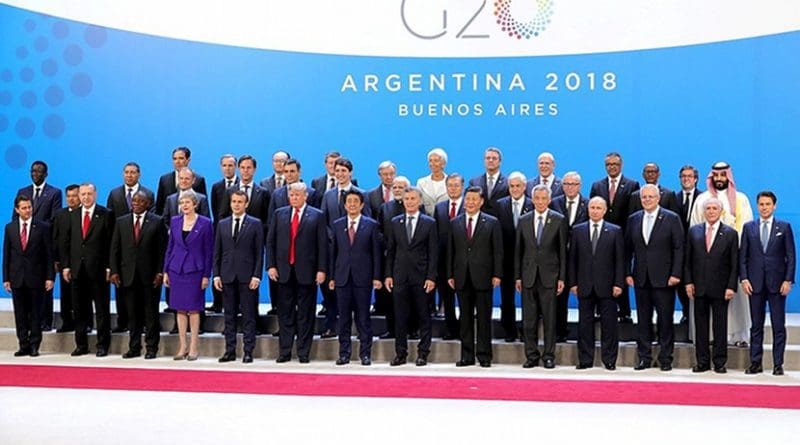G20 At Ten: Time For Greater Multilateral Role – Analysis
By RSIS
The G20 summit last weekend in Argentina resulted in a truce between Washington and Beijing and pledged to reform the WTO. It is now time for the G20 to play a bigger role in the multilateral trading system.
By Pradumna B. Rana*
The G20 summit turned 10 when it was convened last weekend in Buenos Aires. The agenda items were infrastructure for development, food sustainability, and gender issues. Yet, much of the attention focused on the trade tensions between the United States and China. Providing some, perhaps temporary, relief, presidents Donald Trump and Xi Jinping called for a 90-day truce: the US will not raise tariffs on US$200 billion worth of Chinese goods from 10% to 25% as previously scheduled on 1 January 2019; in turn China agreed to purchase an unspecified but “very substantial” amount of American agricultural, energy, industrial and other products.
The summit narrowly avoided the failure of the recent APEC summit in issuing a joint declaration. In the short communique, leaders acknowledged that the current multilateral trading system is “falling short of its objectives” and supported “necessary reform” of the World Trade Organisation (WTO). This pronouncement was significant, if not historic, as it was arguably the first time that WTO “reform” was discussed at the G20 summit.
G20 and Multilateral Trading System
The G20 was born in the aftermath of the Asian financial crisis of 1997-98 as an informal platform for finance ministers and central bank governors from major economies. It was upgraded to the annual summit level meeting in 2008 after the onset of the global financial crisis. Since then, the G20 has been labelled by the participating countries as “the premier forum for international economic cooperation”.
Indeed, ten years on, contrary to the belief of some, the G20’s contributions to global governance have been respectable. Among its successes are efforts to avert a world-wide depression, establish the Financial Stability Board to safeguard the global financial system, broker International Monetary Fund (IMF) reform to give greater voice to emerging markets, make cross-border taxation easier and fairer, put forward principles to guide IMF’s and World Bank’s policy-based lending, and promote complementarities between the IMF and regional financial safety nets.
In the area of international trade, however, the G20 is punching below its weight. Apart from calling on the WTO to monitor the group’s adherence to resisting trade-restricting measures, the G20 plays a fairly minimal role in shaping the prevailing global trading architecture. This has to change.
This is not only because robust international trade is a global public good that can do much good to the G20’s core mandate of achieving growth, but also because no other institution is better positioned than the G20 in terms of the collective clout that it possesses.
G20 and WTO Reform
G20 should debate and push for WTO governance reform as it did successfully in the case of the IMF.
The WTO currently presides over a working decision-making protocol based on a system of full consensus while holding itself to a “one country, one vote” principle of egalitarian participation. The advantage is that the WTO enjoys a greater degree of legitimacy as compared to the IMF and World Bank, but its decisions are often taken at a glacial pace and the WTO has progressively become an ineffective organisation.
To reverse this situation, the G20 should take the lead to contemplate and lobby for alternative structures, processes and procedures to speed up WTO decision-making and governance. One option is for the G20 to champion for a weighted voting system that takes into consideration country size, economic development, market access and trade dependency. There are surely other options that could be considered as well.
Need for Permanent G20 Secretariat
To take forward any potential WTO reforms, the G20 itself must be strengthened institutionally. The G20 is an inter-governmental consultative mechanism and not a formalised organisation with a dedicated secretariat. This informal structure which worked well in the past, needs to be strengthened.
The G20 is transitioning into a general-purpose global steering body whose mandate covers a wide array of topics like structural reforms, science and technology, gender equality, anti-corruption, development, thought leadership, energy security and migration. There is a strong rationale for equipping the G20 with a nimble but permanent secretariat to improve its workings.
In the absence of a secretariat, the agenda-setting power resides in the individual host presidency in any given year. Agenda coherence and complementarity from one summit to the next are typically low. Even the Troika system consisting of past, present and future G20 chairs is unable to satisfactorily reduce the inherent discontinuity in the yearly handover process.
Another problem is that without a secretariat for follow-up and management of institutional memory, the realisation of key G20 resolutions, especially the inherited tasks and programmes that require multi-year efforts, is oftentimes unfocused, incomplete and inconsistent.
Unfortunately, the Buenos Aires G20 declaration failed to mention the idea of a secretariat. As Japan and Saudi Arabia join the presidency troika in 2019, further considerations should be given to the proposal to establish a permanent G20 secretariat. Otherwise, G20 would find it difficult to shake off its image as a weak organisation.
*Pradumna B. Rana is Associate Professor and Coordinator of the International Political Economy Programme in the Centre for Multilateralism Studies (CMS) at the S. Rajaratnam School of International Studies (RSIS), Nanyang Technological University (NTU), Singapore. Xianbai Ji is a PhD candidate at RSIS.

